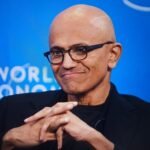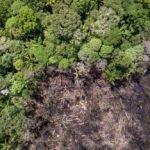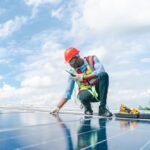In a new research paper, the Congressional Budget Office (CBO) studied both positive and negative contributions to gross domestic product, from longer growing seasons in colder climates to drought to damage to factories from more intense storms.
The nonpartisan budget referee agency have also recently stated that “the effects of climate change since 2000 will slow U.S. economic growth slightly over the next 30 years, adding another drag on an economy that will struggle to rebound from the coronavirus pandemic”.
It is projected that on net, climate change will reduce real U.S. GDP by an average of 0.03% annually from 2020 to 2050, in comparison to what U.S. growth would have been if global climate conditions remained the same as they were in 2000.
That reduction in the growth rate, accumulated over 30 years, lowers the CBO’s projected level of real GDP output in 2050 by 1%, the finding showed.
The paper was incorporated into the CBO’s long-term budget outlook released on Monday, which projected that U.S. federal government debt now is expected to reach nearly double the country’s GDP output in 2050 as interest costs from increased borrowing run annual budget deficits higher.
CBO researchers said that some aspects of climate change are incorporated quickly and directly, while others are more indirect and could take longer to manifest themselves. For example, extreme heat that lowers a farmer’s crop yield would immediately reduce that farmer’s contribution to GDP. A farmer in a cold-weather location might experience a longer growing season, increasing contributions to GDP.
A hurricane that destroys $50 million worth of factory equipment would affect GDP in several ways, including reduced production immediately, and money spent to replace the equipment. However, the overall capital stock would be smaller in the future, as a result of foregone investments to pay for the replacement costs, leading to less GDP output in the future, the CBO said.
The CBO said the research comes with a high degree of uncertainty and the projections represent the middle of a range of outcomes.
Reported by David Lawder
Sourced Reuters
For more Business & Leadership news follow i-invest Online
- Learn the hidden behaviours of history’s great strategists
 History’s great strategic thinkers prove that strategy isn’t about theory, it’s about behaviour, and impact follows those who practise a certain approach, writes Charlie Curson Senior leaders often assume strategy is about intellect, information, or industry expertise. But history’s greatest strategists – across fields as diverse as civil rights, science, sport, politics, exploration and business… Read more: Learn the hidden behaviours of history’s great strategists
History’s great strategic thinkers prove that strategy isn’t about theory, it’s about behaviour, and impact follows those who practise a certain approach, writes Charlie Curson Senior leaders often assume strategy is about intellect, information, or industry expertise. But history’s greatest strategists – across fields as diverse as civil rights, science, sport, politics, exploration and business… Read more: Learn the hidden behaviours of history’s great strategists - Be sure your team functions as one in 2026
 Claire Pattison of Manchester Metropolitan University explores a range of practical steps to improve your management skills in the remote and hybrid era In 2026, it will be more important than ever for remote managers to create an environment of collaboration and inclusion. Yet, according to the TeamFlect 2025 Remote & Hybrid Work Stats Report,… Read more: Be sure your team functions as one in 2026
Claire Pattison of Manchester Metropolitan University explores a range of practical steps to improve your management skills in the remote and hybrid era In 2026, it will be more important than ever for remote managers to create an environment of collaboration and inclusion. Yet, according to the TeamFlect 2025 Remote & Hybrid Work Stats Report,… Read more: Be sure your team functions as one in 2026 - Supply chain risk starts where transparency ends
 It’s time for businesses to recognise that scientific integrity is critical to ethical supply management, says Rupert Hodges of origin verification pioneers Oritain Today, the global supply chain is at an inflection point, driven by geopolitical volatility and the climate crisis. This change requires a shift away from networks optimised solely for cost, instead moving… Read more: Supply chain risk starts where transparency ends
It’s time for businesses to recognise that scientific integrity is critical to ethical supply management, says Rupert Hodges of origin verification pioneers Oritain Today, the global supply chain is at an inflection point, driven by geopolitical volatility and the climate crisis. This change requires a shift away from networks optimised solely for cost, instead moving… Read more: Supply chain risk starts where transparency ends - It’s time to future-proof the frontline
 Frontline workers are currently the last to benefit from tech innovation, representing a blind spot that’s holding AI back, says Deepesh Banerji of Deputy According to recent research from Moneypenny, AI is now powering three-quarters of UK businesses. It’s the most heavily funded technology wave of our lifetime. Yet less than 1% of global tech… Read more: It’s time to future-proof the frontline
Frontline workers are currently the last to benefit from tech innovation, representing a blind spot that’s holding AI back, says Deepesh Banerji of Deputy According to recent research from Moneypenny, AI is now powering three-quarters of UK businesses. It’s the most heavily funded technology wave of our lifetime. Yet less than 1% of global tech… Read more: It’s time to future-proof the frontline - Making trade work for Africa
 Africa’s potential is unlimited, yet inefficient supply chains, combined with disjointed policy and regulation continue to hold it back. Graham Bright of Euro Exim Bank looks at how this can change Just as a week is a long time in politics, it has been a busy few weeks in international trade. Recently, we at Euro… Read more: Making trade work for Africa
Africa’s potential is unlimited, yet inefficient supply chains, combined with disjointed policy and regulation continue to hold it back. Graham Bright of Euro Exim Bank looks at how this can change Just as a week is a long time in politics, it has been a busy few weeks in international trade. Recently, we at Euro… Read more: Making trade work for Africa

